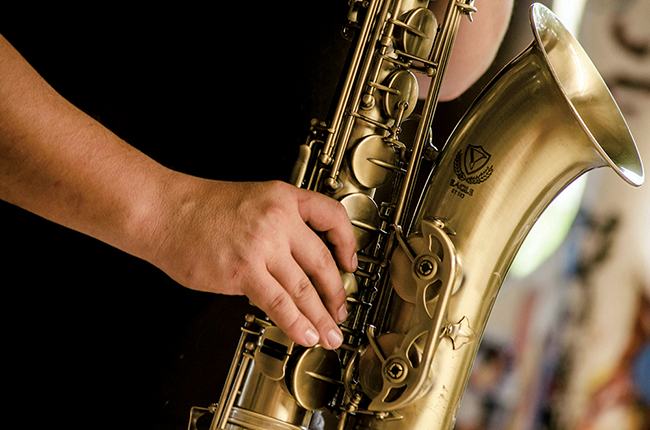Hungry bear visits cause trash jam in Padua Hills
Black bear sightings have become somewhat commonplace in the City of Trees. Foothill communities, such as Padua Hills and Claraboya, are especially apt to have bear visitors in the fall and summer months during years without a significant amount of rainfall.
The drought conditions affecting southern California for the past several years have made it even more difficult for the animals to find sustenance in the Angeles National Forest. Their natural food supply is drying up, which means they’ve begun looking for other sources, often in our own neighborhoods.
Such was the case for a black bear family in search of food last month who found themselves in a bit of a jam at Padua Hills Theatre. Two bears cubs, drawn to the waste within a lidless recycling bin on the property used by Chantrelle’s catering, climbed inside the receptacle and were unable to find a way out.
“I saw the mama bear pacing back and forth and heard the baby bears calling for their mama,” said Paul Faulstitch, professor of environmental analysis at Pitzer College. “Mama gave me some space. I found an extension ladder behind the theater, put it in the bin and within a couple of minutes the family was reunited.”
Mr. Faulstitch has been working on a project with the city that utilizes wildlife cameras to track animal behavior and movement in the foothills north of Claremont. While on his way to check one of the cameras near the theater, he stumbled across the bears and their predicament, which he later shared in a “Viewpoint” in the COURIER.
Padua Hills Theatre and Chantrelle’s owner Richard Lindholm doesn’t agree with Mr. Faulstitch’s assertion that he has behaved irresponsibly, stating that he has asked the city repeatedly for bear-proof bins and has been told on numerous occasions that there is no money in the budget.
“The city is responsible for the trashcans,” Mr. Lindholm. “I don’t own the trash disposal. It’s their trashcans and they need to deal with it at this point.”
On November 17, the city delivered what everyone hopes is a solution to the problem—a recycling bin with a locking top.
“The lid is made of thick metal, not plastic, which we hope the bears cannot bend,” Kathleen Trepa, community services director wrote in an email to the COURIER. “We ordered thicker material than we have used previously. This is material we order to use for this purpose; it is not a pre-manufactured, certified bear-resistant lid that we install. We are fabricating the locking lid. We will know how effective it is with time and use.”
Ms. Trepa noted that materials and staff costs for the bin the city assembled totaled $550, about $1,000 less than the cost to purchase a ready-made, bear-resistant bin. Ms. Trepa added that the city will swap-out Chantrelle’s locking trash bin next week to reinforce the closure mechanism as well.
Using their extraordinary sense of smell, bears can find natural food resources on their own, which is why wildlife officials stress that it’s vital not to feed them. It’s also important to secure food and garbage appropriately. Bears will eat anything from garbage to pet food and find water in nearby streams or manmade water fixtures, including those found in residential yards.
Unfortunately for residents near the foothills, bear-resistant waste containers have not been provided by the city to help deter the problem. However, city staff is working on finding a possible solution.
“The city met with the California Department of Fish and Wildlife to get better recommendations that resulted in two samples of bear-resistant curbside containers,” explained Ms. Trepa.
“Bears are after the easiest meal with the least amount of effort. The trash itself is the primary attractant,” says Rebecca Barboza, wildlife biologist with the California Department of Fish and Wildlife. “And it’s not just the [Padua Hills] theater, it’s the whole community. Residents provide food for bears through garbage, koi ponds, pet foods left outside, bird feeders, fruit trees…the entire foothill community needs to work together to prevent it.”
The Webb Schools, also located in the Claremont foothills, has had plenty of interaction with bears over the years. With over 400 teens on campus, school administration has the added responsibility of ensuring their students’ safety and work diligently to make the campus a safe environment for both man and beast.
“The whole secret is providing education throughout our community, and the bear-resistant trash receptacles,” says Janet Peddy, chief financial officer at Webb Schools. “We have them throughout campus and have carved out the expense in our operating budget. Over time, it’s been a good investment.”
The school purchased their receptacles from Bearsaver, the leading supplier of bear-resistant enclosures and containers located in Ontario. The company offers two varieties of bear-resistant three-yard dumpsters starting at $1570 as well as residential trash carts starting at $161 for a 32-gallon container.
“We tried to get something that wasn’t too esthetically displeasing,” says Ms. Peddy of the three-yard, pitch-style dumpster. “The longest one we had lasted about seven years. They are challenging to get into, even for humans sometimes, but they work.”
Adding to their success, Webb does all of its own internal trash pick-up, securing it in bear-resistant bins located behind a bear enclosure until the day the city comes to the campus to pick it up for disposal.
“The most powerful thing you can do to help ensure the bears’ safety too is secure your trash,” says Ms. Peddy. “We really try to do our part.”
Jennifer Wile, event coordinator with the Padua Hills Theatre, admits that because of the theater’s close proximity to the hillside, bears and other wildlife have been frequent visitors to the venue since the 1980s. She is adamant that the safety of the guests as well as that of the animals remains a top priority.
“We’re trying to solve the problem,” says Ms. Wile. “The city has been fantastic in working with us to find a solution to secure the trash bins.”
“Chantrelle’s is very motivated to fix the problem,” said Ms. Barboza. “The city of Claremont has been very proactive to find solutions to trash management for wildlife and we applaud them for that.”
—Angela Bailey
news@claremont-courier.com










0 Comments